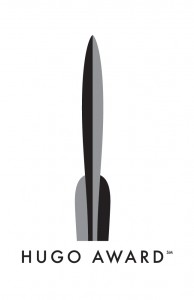You have no items in your cart. Want to get some nice things?
Go shopping The Hugo Awards have been running for over fifty years and remain the best known literary award for science fiction writing. The nominees for this year were announced recently, so this week I’ve been reading the entries for the Best Short Story category.
The Hugo Awards have been running for over fifty years and remain the best known literary award for science fiction writing. The nominees for this year were announced recently, so this week I’ve been reading the entries for the Best Short Story category.
The awards are named after Hugo Gernsback, founding editor of the cult sci-fi magazine Amazing Stories, which was pivotal in popularising the genre in the mid-20th century. (Gernsback also had a crater on the moon named after him; I mean, an awards ceremony honouring your memory is cool and all, but I think I’d go for the moon crater if I had to choose.)
Over that time many big names in sci-fi have been recognised, and the list of past nominees makes a to-read list stretching back over most of the history of the genre: Alfred Bester, Fritz Leiber, Anne MacCaffrey, Robert A. Heinlein, Clifford D. Simak, Ursula Le Guin, Phillip K. Dick, Arthur C. Clarke, Frank Herbert, Brian Aldiss, Kurt Vonnegut, Joe Haldeman, China Miéville, and J.K Rowling.
You can judge the nominations in the Best Short Story category for yourself; I had no problem tracking down all the stories online for free (legally, of course). This is a great thing—I doubt it would be so easy to track down other short story prize shortlists. Perhaps it’s something about the science fiction genre which tends to attract writers who are also au fait with websites, blogs, online magazines, and ebooks and who understand the advantages of making your work available to readers. It meant that I could read work by writers I’ve not heard of, and probably wouldn’t otherwise have encountered. It seems a shame though that the five nominees come from only three sci-fi magazines. Surely there must be a wider pool of online and print publications to choose from? I can think of several that print great stories—Interzone and Murky Depths, for example.
The entries vary quite widely in quality. “The Bride of Frankenstein” by Mike Resnick is a mildly diverting but ultimately corny take on an old story, which manages to reheat some of the old clichés enough to give them a vague semblance of life, but not much more than a twitch.
“The Moment” by Lawrence M. Shoen is more interesting, because it contains a genuinely sci-fi “what if” idea about the relationship between tiny moments and huge stretches of time. But it verges on a Douglas Adams imitation tour of a universe populated by crazy beings and made-up alien-sounding words, which teeters close to losing the reader’s interest at some points.
“Bridesicle” by Will McIntosh deals with the idea of a future technology that can bring the dead back to life, and what that might mean for the speed dating scene. It’s funny and moving in places, and delivers a nice sense of the claustrophobia of being a brain in a dead body desperate to be reborn.
“Non-Zero Probabilities” by N. K. Jemisin is a well written story, sci-fi set in a colourful, present-day New York where the laws of probability and chance have gone dangerously wrong.
But “Spar” by Kij Johnson is by far the most imaginative and intriguing piece, a story that grips you right from the start, partly because it’s so starkly horrible, taking a possible interaction between an alien life form and a human to intimately physical and nasty extremes. But it’s also a meditation on what the differences between two life forms might actually encompass, and what an ability or inability to communicate might mean. It’s also got a great ending, which the other entries rather lack. I think it’s “Spar” that will stick with me as a story, and I hope it wins.
Subscribe to Litro Lab via itunes RSS | More

About Emily Cleaver
Emily Cleaver is Litro's Online Editor. She is passionate about short stories and writes, reads and reviews them. Her own stories have been published in the London Lies anthology from Arachne Press, Paraxis, .Cent, The Mechanics’ Institute Review, One Eye Grey, and Smoke magazines, performed to audiences at Liars League, Stand Up Tragedy, WritLOUD, Tales of the Decongested and Spark London and broadcasted on Resonance FM and Pagan Radio. As a former manager of one of London’s oldest second-hand bookshops, she also blogs about old and obscure books. You can read her tiny true dramas about working in a secondhand bookshop at smallplays.com and see more of her writing at emilycleaver.net.





